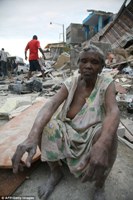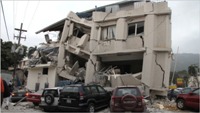
Holding a press conference shortly after his return from Haiti, Jesse Jackson, pressing through a surge of sorrow, indicated the worst horror he witnessed was “babies looking for their mothers they will never see again.” In the face of this unfathomable tragedy, Jackson praised the international relief effort, and declared that the cooperation of doctors from around the world, even from nations at war with one another, “was a ‘hopeful sign.'”In an article published by the Chicago Sun-Times two days prior to the press conference, Jackson also praised the overflowing support shown by Americans who have donated millions to further relief. However, problems in the delivery of relief have not been absent. Jackson was distressed by the over-emphasis on security that has hampered the mobilization of relief. In Port-au-Prince, Haiti’s capital, Jackson saw “more police stations than water and rice stations.” Furthermore, due to U.S. State Department restrictions, Haitian-American doctors seeking to serve the ailing Haitians have been denied entry into the country.

Reflecting upon the horror being experienced in Haiti, Jackson asks, “What can we learn from this tragedy?” Taking a broad view of the situation that encompasses Haiti’s past, present, and future, Jackson identifies two key lessons. First, we learn the true cost of poverty. The 7.0 magnitude earthquake that leveled houses and business, government offices and presidential palaces, and stole the lives of up to 200,000 children, women, and men finds a parallel of sorts in 1994 Southern California. When a quake of similar magnitude struck Southern California, it caused $25 billion dollars worth of property damage and swept away the lives of 72 human beings.

According to Jackson, the striking difference between the two outcomes is economic. In Haiti, constant and consistent poverty has sapped “the government’s ability to respond” and has left “the citizenry exposed.” Lack of financial resources has engendered institutional and structural vulnerability that is clearly seen in the example of building codes. The ability to design and construct buildings that withstand earthquakes is available; but, the necessary requirement is funding. In Southern California, there is enough money to enforce strict building codes and construct the buildings accordingly. In Haiti, this is not the case.
The second lesson to be learned is that “relief is vital – but not enough.” For Jackson, the relief effort must eventually be transformed into a reconstruction effort. The reconstruction of Haiti must be undertaken with as much vigor and resources as that which enabled the reconstruction of Europe following the devastation of World War II. Jackson is careful to note that reconstruction, though funded by international collaboration, must be guided and implemented by Haitians. Speaking directly, he said, “It should be Haitians, not Haliburton” who rebuild Haiti. Such an approach would protect Haitian sovereignty and help diminish poverty among the country’s population.

Jackson perceives that America has a special role in funding the reconstruction of Haiti. He recognizes that this is a striking claim since America itself is in need of reconstruction (while fighting two wars and having 25 million people unemployed). Yet, the reconstruction of Haiti is a higher priority because Haiti is our neighbor. Haiti is our neighbor both geographically and historically, and the manner in which we respond to Haitian need will be the measure of our society.
Due to the geographic proximity of Haiti to America, and given the depressed conditions within the country, many Haitians seek refuge on American shores. But, they make the “treacherous journey” in vain since current U.S. policy denies entrance to these refugees. By improving conditions in Haiti, Jackson believes this life-threatening situation will be relieved. He writes, “The answer is not to trample the lives of the desperate. The answer is to remove the conditions of their desperation.” By reconstructing the Haitian homeland, America will aid in the healing of its geographic neighbor and relieve tensions over illegal immigration.
Not only is Haiti a geographic neighbor to America, but Haiti is the historic neighbor of America. In 1791, Haitians revolted against French rule and won political liberty. As a result of this successful revolution, Napoleon lost a strategic foothold for managing French lands in the New World. In turn, France sold the “Louisiana Purchase” to the burgeoning American nation. This purchase exponentially facilitated the growth of American power. Hence, “We owe Haiti deep gratitude,” proclaims Jackson, for without their success, our success may not have been possible.
Echoing Christian ethical principles, Jackson states, “Because it is our neighbor, Haiti has a call upon us.” And he perceives that “Across the world, American good will is measured, in part, by how we treat the poorest of nations – particularly in our own neighborhood.” The world has already taken note of the magnanimous aid that Americans have already given to Haiti in this time of crisis; yet, Jackson calls the U.S. to be mindful of the future. He closes his article with the following charge: “Now let us demonstrate our commitment to the long-term emergence of Haiti, not simply its short-term survival. That will earn us respect not only in Haiti, but throughout the region and the world. If we can build hope out of this despair, we will show that we truly are good neighbors.”
Jackson’s remarks during the press conference and within his article are fitting during this time of suffering for they call us to look not just at the present, but also to the past and beyond to the future. For without this broader view, we fail to understand the causes of present events, and we fail to create a vision for the future that serves as a guide for present action.
Links
To read the Chicago Sun-Times report of Jackson’s press conference written by Frank Main and Mary Wisniewski click here.
To read Jesse Jackson’s article “Haitians will Need Our Help Long after Quake” published in the Chicago Sun-Times click here.



